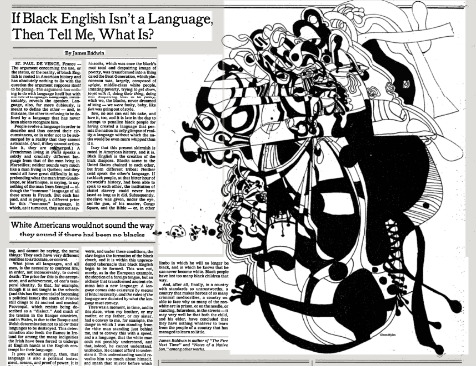The Welcome Table, 1970s-1980s
This flag has been planted on the moon:/ it will be interesting to see / what steps the moon will take to be revenged / for this quite breathtaking presumption.
James Baldwin, "Staggerlee wonders," in Jimmy's Blues, and other poems
After Martin Luther King, Jr.’s assassination on April 4, 1968, Baldwin left the U.S. to live in France. Baldwin’s work in the last decades of his life was varied and deeply complex. In 1971, he published A Rap on Race, a transcript of a dialogue between himself and famous anthropologist Margaret Mead. His work in 1976, The Devil Finds Work, a mixture of memoir and film criticism, confounded critics. The same year he published his only children’s book, Little Man Little Man, A Story of Childhood. Baldwin planned a personal account of the lives and assassinations Medgar Evers, Martin Luther King and Malcom X, but never completed the project. Raoul Peck’s 2016 film, I Am Not Your Negro, imagines this account through an assemblage of writings and clips of Baldwin. One of his last publications, was a collection of poems in 1983, Jimmy’s Blues, and other poems.
President Francois Mitterrand awarded Baldwin the Legion d’Honneur in 1986. Later that year, he was diagnosed with advanced esophageal cancer. James Baldwin died on December 1, 1987 at the age of 63. He left an unfinished play, The Welcome Table, which remains unpublished. His home in Saint Paul de Vence appears both as the setting and a character. The play explores the need for hospitality, rest, and community.
The house where James Baldwin lived and died in Saint Paul de Vence, France (image taken July 2009)
"Martin Luther King, Jr. was assassinated on April 4, 1968 while I was living in California. That devastated my universe and was ultimately to lead me to this house."
James Baldwin, Architectural Digest, August 1987
A language comes into existence by means of brutal necessity, and the rules of the language are dictated by what the language must convey. There was a moment, in time, and in this place, when my brother, or my mother, or my father, or my sister, had to convey to me, for example, the danger in which I was standing from the white man standing just behind me, and to convey this with a speed, and in a language, that the white man could not possibly understand, and that, indeed, he cannot understand, until today. He cannot afford to understand it. This understanding would reveal to him too much about himself, and smash that mirror before which he has been frozen for so long.
James Baldwin, Black English
Image by Anne Knafl
"This self-conception of white America as a psychological process by which the West in its entirety comes to fashion a positive identity through the negation and destruction of the Other is realized first linguistically. While interpreting this fact follows Gadamer's hermeneutics of translation, Baldwin's conception of linguistic situatedness differs strongly from Gadamer's 'linguisticism'. Unlike Gadamer, Baldwin sees linguistic appropriation, or being-in-translation, as the only form of linguistic situatedness possible, for all, thus emphasizing the language's own constitutive character over any essentialist understanding of linguistic production. For Baldwin, language is the historical accretion of power as the ability and right to name the world in terms of psychological cost or, as Baldwin puts it, the 'price of the ticket'." Mark Christian Thompson. Phenomenal Blackness : Black Power, Philosophy, and Theory, 30.
"If Black English Isn't a Language, Then Tell Me, What Is?" on New York Times time machine
“I hope to God I never see another flag as long as I live. I would like to burn them all—burn every passport, abolish every border.”
James Baldwin, The Welcome Table
Image from National Museum of African American History and Culture, “A Place for Gathering, Healing, and Writing.”
"This philosophy of an inclusive human family or community is clear throughout the play. The characters come from all over the world. They are American, French, and Algerian; Muslim, Jewish, and Christian; black, white, and Creole; gay, straight, and bisexual. The barriers of nationalism are replaced by the open doors of cosmopolitanism...This openness was, indeed, the governing philosophy of Baldwin’s actual home."
Joseph Vogel. 2018. James Baldwin and the 1980s : Witnessing the Reagan Era, 90-91.
The Welcome Table manuscript is held at Harvard University


